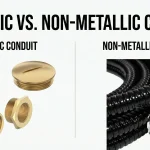Introduction
Why Do We Use Copper Tape on Underground Cables? When it comes to the vast network of electrical power distribution and transmission, underground cables play a crucial role in ensuring a safe and efficient supply of electricity to homes, businesses, and industries. These cables are often subjected to various environmental challenges, including moisture, soil acidity, and mechanical stress. To safeguard the integrity and longevity of underground cables, engineers and technicians rely on a time-tested solution: copper tape.
The Power of Copper Tape
Copper tape, a highly conductive and corrosion-resistant material, has been a staple in the electrical industry for decades. Its exceptional properties make it an ideal choice for protecting underground cables from external factors that could jeopardize their performance and lead to costly disruptions.
Why Do We Use Copper Tape on Underground Cables?
Here are the following points given below, why do we use copper tape underground cables:
1. Electrical Conductivity: A Vital Characteristic
Copper stands out among metals due to its exceptional electrical conductivity, making it an integral component in various electrical applications. When used in the form of copper tape on underground cables, this outstanding conductivity helps in minimizing power loss during transmission. It enables electricity to flow with minimal resistance, ensuring that the energy reaches its destination efficiently.
2. Corrosion Resistance: Defying the Elements
Underground cables are exposed to diverse environmental conditions, including soil moisture and chemical substances that can lead to corrosion. Copper tape’s inherent corrosion resistance acts as a formidable barrier against these destructive forces, safeguarding the cable’s structural integrity and ensuring prolonged service life.
3. Flexibility: Adapting to Terrain Changes
One of the significant advantages of copper tape is its flexibility, which allows it to adapt to various terrain changes. As underground cables may traverse through diverse landscapes, from rocky terrains to softer soils, the pliability of copper tape ensures a smooth installation process and minimizes stress on the cables during shifting ground conditions.
4. High Tensile Strength: Withstanding Mechanical Stress
Underground cables are susceptible to mechanical stress from various sources, such as nearby construction activities or natural ground movements. Here, copper tape shines again with its exceptional tensile strength, which imparts resilience to the cables and prevents damage or breakage, even under challenging circumstances.
5. Heat and Fire Resistance: Safety First
Electrical fires pose a severe threat to life and property. The use of copper tape on underground cables enhances safety due to its high heat resistance. In the event of a fault or overload, the copper tape can withstand elevated temperatures, helping prevent the spread of fire and ensuring a safer environment.
6. Low Thermal Expansion: Stability in Temperature Variations
Temperature fluctuations can cause materials to expand and contract, which may lead to mechanical stresses on cables and connections. However, copper tape’s low thermal expansion coefficient helps maintain stability in varying temperatures, minimizing the risk of damage and ensuring continuous electrical conductivity.
7. Easy Installation and Maintenance: Time-Efficient Solution
Copper tape’s malleability and ease of handling make it a practical choice for cable installation. Technicians can effortlessly wrap the tape around the cables, creating a secure and uniform shielding layer. Additionally, its low maintenance requirements reduce operational costs and contribute to its widespread usage in the industry.
8. Compatibility with Insulating Materials: A Perfect Match
For underground cables, insulation is as crucial as the conductive component. Copper tape complements various insulating materials exceptionally well, such as cross-linked polyethylene (XLPE) and ethylene propylene rubber (EPR). This compatibility ensures optimal electrical performance and further fortifies the cable against potential hazards.
9. Effective Electromagnetic Shielding: Preventing Interference
In modern urban settings, underground cables often share their space with various communication and data transmission lines. Copper tape’s conductive nature makes it an effective electromagnetic shield, preventing electromagnetic interference (EMI) from affecting the signals in neighboring cables, thus maintaining the overall system’s efficiency.
10. Environmentally Friendly Choice: Sustainability Matters
With the growing emphasis on sustainability and environmentally friendly practices, copper tape aligns perfectly with these principles. Copper is a natural resource that can be recycled without any loss in quality. Opting for copper tape on underground cables promotes sustainable practices in the electrical industry.
Conclusion
Why Do We Use Copper Tape on Underground Cables? The choice of copper tape for protecting underground cables is a testament to the material’s exceptional properties and its ability to address the challenges posed by various environmental factors. From its remarkable electrical conductivity and corrosion resistance to its flexibility and ease of installation, copper tape proves to be an indispensable asset in the realm of electrical power distribution and transmission.
In the face of a rapidly evolving world, where energy demands continue to rise, the reliance on underground cables will undoubtedly grow. As we forge ahead into a future fueled by innovation, copper tape will remain a stalwart companion, ensuring the reliable and efficient flow of electricity beneath our feet.
FAQ:
A. Copper tape’s remarkable electrical conductivity minimizes power loss during the transmission of electricity through underground cables. By offering low resistance to the flow of electrons, the tape ensures that energy reaches its destination with minimal wastage, making the overall power distribution system more efficient.
A. Underground cables are exposed to moisture and chemical substances present in the soil, which can lead to corrosion and structural damage. Copper tape’s inherent corrosion resistance acts as a protective barrier, preventing these destructive elements from compromising the integrity of the cables.
A. The flexibility of copper tape allows it to adapt to diverse terrains, including rocky landscapes and softer soils. This pliability ensures a smooth installation process and reduces stress on the cables when encountering changes in the ground’s structure.
A. Underground cables can face mechanical stress from construction activities or natural ground movements. Copper tape’s high tensile strength provides resilience to the cables, preventing damage or breakage, even under challenging circumstances.
- Top Mistakes When Installing Cable Glands | Cabex India
- Causes of Cable Gland Failures & Prevention Guide | Cabex India
- Waterproof Cable Gland vs Explosion Proof Difference: A Practical Industrial Guide
- Are Cable Glands Waterproof? A Practical, Engineering-Level Guide to Selection and Installation
- Metallic vs. Non-Metallic Conduit: The Definitive 2026 Guide for Smarter Electrical Systems








